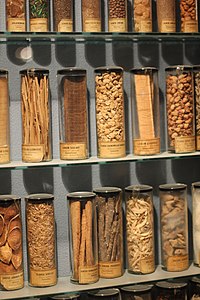
Photo from wikipedia
Prunus armeniaca L. (Rosaceae)-syn. Amygdalus armeniaca (L.) Dumort., Armeniaca armeniaca (L.) Huth, Armeniaca vulgaris Lam is commonly known as the apricot tree. The plant is thought to originate from the… Click to show full abstract
Prunus armeniaca L. (Rosaceae)-syn. Amygdalus armeniaca (L.) Dumort., Armeniaca armeniaca (L.) Huth, Armeniaca vulgaris Lam is commonly known as the apricot tree. The plant is thought to originate from the northern, north-western, and north-eastern provinces of China, although some data show that it may also come from Korea or Japan. The apricot fruit is used medicinally to treat a variety of ailments, including use as an antipyretic, antiseptic, anti-inflammatory, emetic, and ophthalmic remedy. The Chinese and Korean pharmacopeias describe the apricot seed as an herbal medicinal product. Various parts of the apricot plant are used worldwide for their anticancer properties, either as a primary remedy in traditional medicine or as a complementary or alternative medicine. The purpose of this review was to provide comprehensive and up-to-date information on ethnobotanical data, bioactive phytochemicals, anticancer potential, pharmacological applications, and toxicology of the genus Prunus armeniaca, thus providing new perspectives on future research directions. Included data were obtained from online databases such as PubMed/Medline, Google Scholar, Science direct, and Wiley Online Library. Multiple anticancer mechanisms have been identified in in vitro and in vivo studies, the most important mechanisms being apoptosis, antiproliferation, and cytotoxicity. The anticancer properties are probably mediated by the contained bioactive compounds, which can activate various anticancer mechanisms and signaling pathways such as tumor suppressor proteins that reduce the proliferation of tumor cells. Other pharmacological properties resulting from the analysis of experimental studies include neuroprotective, cardioprotective, antioxidant, immunostimulatory, antihyperlipidemic, antibacterial, and antifungal effects. In addition, data were provided on the toxicity of amygdalin, a compound found in apricot kernel seeds, which limits the long-term use of complementary/alternative products derived from P. armeniaca. This updated review showed that bioactive compounds derived from P. armeniaca are promising compounds for future research due to their important pharmacological properties, especially anticancer. A detailed analysis of the chemical structure of these compounds and their cytotoxicity should be carried out in future research. In addition, translational pharmacological studies are required for the correct determination of pharmacologically active doses in humans.
Journal Title: Plants
Year Published: 2022
Link to full text (if available)
Share on Social Media: Sign Up to like & get
recommendations!